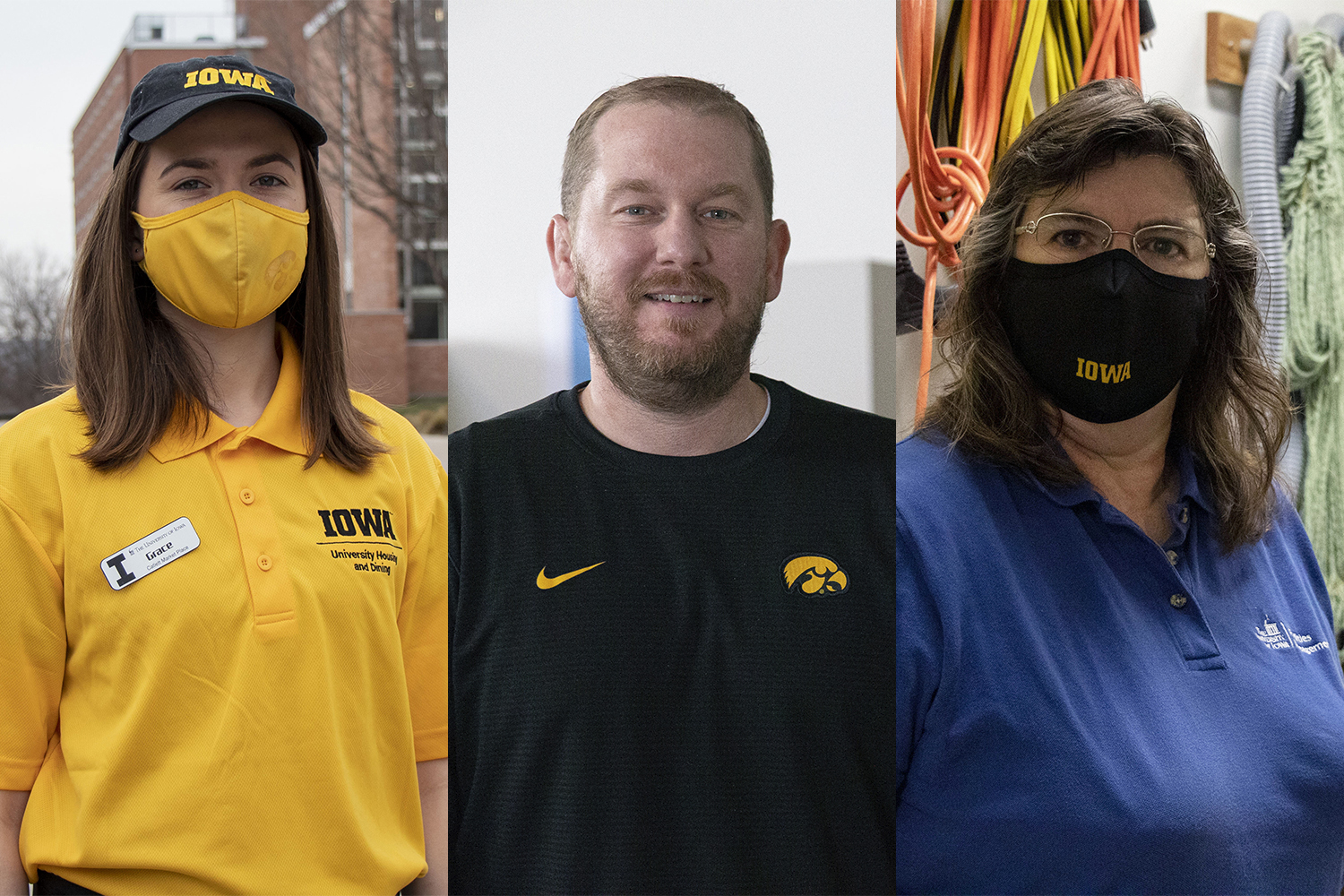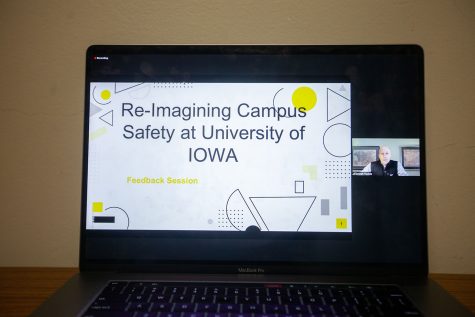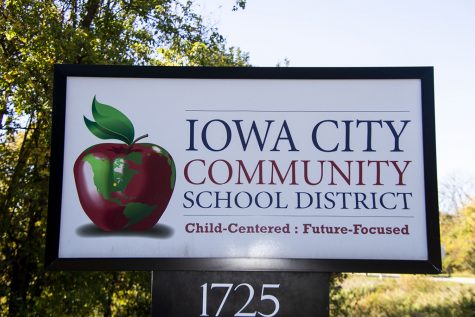The people who kept the UI running over the past year: in IT, custodial services, and dining
Employees from key services that kept campus running over the past year — IT, custodial services, and dining employees — speak on what it means to be “essential.”
March 23, 2021
Yellow, pink, green, and orange post-it notes cling to the whiteboard in the home office of University of Iowa Instructional Technology Consultant Michael Espey. Organized in the same way that Espey would have it if he was on campus, the whiteboard divides his day into different sections for different services, offering a sense of normalcy even as he marks a year of working from home.
Less normal, however, is the flat-coated retriever, Shadow, who remains steadfastly at Espey’s side as he looks through student tickets, offering technical assistance for students and staff struggling with the pandemic-essential learning tools of ICON and UI Capture.
Espey, one of six people on his team who ensures the maintenance of online services, freely admits to struggling with his work-life balance when the temptation to continue work is still inside his home. But to him, perseverance is hopeful.
“The wheels kept moving,” Espey said. “Even though everything stopped, and the world changed.”
Espey is one of many unspoken heroes of the pandemic: the workers who embraced the unique challenges of the situation and have spent the last year working behind the scenes with little public acknowledgment. They are the people who have ensured as much normalcy as possible at the UI, in spite of massive changes.
Change is something that Catlett Dining Hall associate and UI sophomore Grace Lange understands well. As an employee at the dining hall since September 2019, Lange was used to what she referred to as the chaos of the dining halls — the close crowds, the collective murmur of dozens of conversations, and the music in the background.
Since COVID-19 took hold of campus, everything is eerily quiet in comparison. For most of the academic year, no one could stay in the dining hall. Recently, the UI opened limited in-person dining services, but for months takeout boxes remained the only campus food option. Lange compared navigating the dining halls to traversing an obstacle course of tables and chairs stacked and stored away in the open, plus huge fortresses of empty (or unempty) boxes.
“It’s quieter because no one is sitting down or having conversations with friends or anything,” Lange said.
In the Medical Education and Research Facilities, Sarah McCain, UI custodial supervisor and employee of 36 years, swipes her card and signs into work at 5:30 p.m., preparing classrooms and cleaning high-touch points to ensure the safety of the students the next morning.
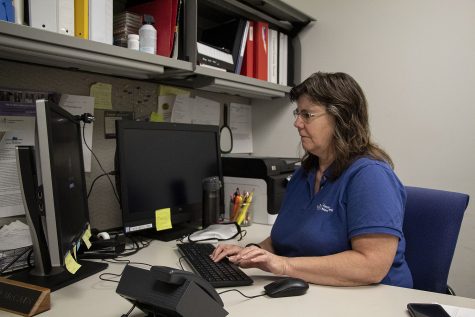
With bottles of blue-tinted sanitizer, McCain and her team work as vigorously as they ever have to stop the spread of the pandemic.
“We added hand sanitizers and masks at the entrance and throughout the buildings,” McCain said. “You get to know your people and you just want to do everything you can to keep everybody safe.”
Safety, as UI President Bruce Harreld told The Daily Iowan in a May 2020 interview, was key in ensuring students and staff were able to remain on campus in the wake of the COVID-19 pandemic. Now, over a year since the UI first closed, unseen essential workers in IT, custodial services, and dining services have ensured that masses of students receive an education despite the strains of the past year.
Often, this has meant going above and beyond what the job may have required before. In addition to regular duties, multiple people from each of their fields identified new areas in which they are serving their school and their community.
In addition to his regular role as a senior communication engineer for IT, Nick Bell was one of the primary people responsible for extending bandwidth at the beginning of the pandemic, allowing for drive-up Wi-Fi services in multiple parking lots across campus.
Bell stressed that the need for this service was immediately present: students and faculty often do not have access to reliable service at home, a problem which is increasingly concerning in the scope of a pandemic that drove most people to their computers. For the last three semesters the UI has operated with more than 70 percent of undergraduate course hours online, meaning online connections have remained vital even past the first few months of the pandemic.
“I think we’re all living in a virtual world now,” Bell said. “Everyone is adjusting to a virtual world and trying to understand everyone’s needs.”
The process was completed a few weeks after the beginning of the pandemic and drive-up Wi-Fi was accessible to students and staff, with the routers placed either in nearby buildings or in cabinets Bell and his team built to house them.
Currently, Bell and his team are some of the only members of IT still on campus who continue to work sporadic hours on a three-year project beginning prior to the pandemic. Their hours can begin as early as five in the morning or end as late as 10 p.m. Even weekends have been sacrificed as they continue to update switches and wireless access points through campus for the project in addition to providing infrastructure support.
In a different IT department, Espey parses through tickets for hours at a time, ensuring user support. While tickets are supposed to be scheduled for only twelve hours per week, Espey explains that he often finds himself working an additional five to 15 hours per week over what is regularly scheduled.
“We had an important job prior to the pandemic, but overnight it really became a little more important,” Espey said.
While there has been no additional hiring to combat the added workload, Espey and his team have come up with solutions to battle the increased calls. A large portion of the support has shifted to be more indirect, Espey said, with limited connect and added training opportunities for common problems.
Bell and Espey are far from the only people who have witnessed their services shift from more direct interaction to indirect.
At Catlett Dining Hall, the self-service style buffets of a year ago have disappeared. Gone, for now, are the days where students could stand in line, packing food onto their plates with the same utensils used by the person before them. Buffets cause cross-contact for germs, so the responsibility for piling on the food falls to the Housing and Dining employees.
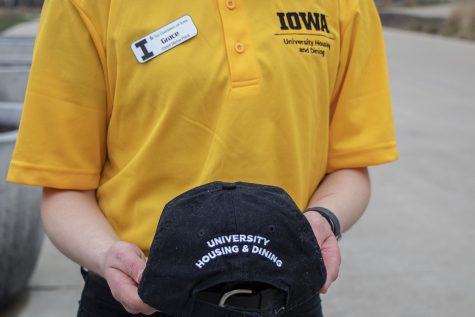
Lange describes this as one of the more challenging switches from pre-pandemic to now. Additional employee time and resources — including new food boxes and employee gloves — are reserved for a process that was once completed by students.
Though the boxes filled with food are compostable, Lange says it still tugs on her conscience as someone who cares for the environment to see the amount of waste she is creating. While the dining halls are doing the best that they can under the circumstances they are in, Lange said it is still difficult to watch.
As for physical distancing behind the counter, Lange says that, given the proximity of the counters, maintaining a full six-foot distance at all times is nearly impossible when co-workers are constantly moving back and forth to change out pans and add more food.
“I will say I have never seen a worker with their mask on improperly,” Lange said. “But it’s almost unavoidable to not have six feet between everyone else.”
Lange also says she worries more about contracting the virus outside of work, where mask-wearing is not so strictly enforced, and less about contracting it at her job as an essential worker. In fact, despite ensuring the cleanliness of common surfaces and a continuous flow of food for students, Lange said she doesn’t even think of herself as an essential worker.
Yet, essential workers come in a variety of forms. Prior to the start of the COVID-19 pandemic, more than 30 million people were estimated to be front-line workers according to the Center for Economic and Research Policy. Overall, more than 2.3 million are expected to work in cleaning industries.
Data visualization by Kelsey Harrell/The Daily Iowan
The UI is no exception. Of the 1,146 students who work for University Housing and Dining, 992 work in dining — nearly 1 in 33 students.
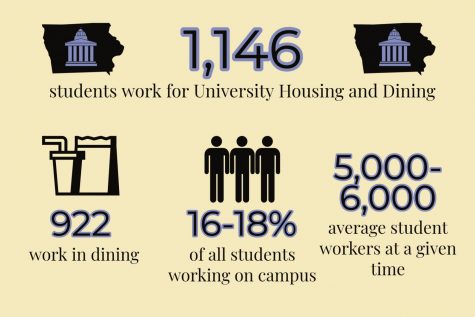
Custodial services also make up a significant margin of UI employees, with 251 people currently employed. And, for Custodial Group leader Bobby Jones, working on the front line is something he addressed as “challenging.”
Additional changes to the job, concerns for himself and others, and reprioritizing certain areas of his job have complicated his work. For more than 20 years, Jones has been employed by the UI and currently spends his evenings, from 5 p.m. to 1 a.m., cleaning the English-Philosophy Building.
He focuses on primary points of contact, such as touchpoints and restroom cleaning, wiping desks and boards, doorknobs and exits to keep COVID-19 out of the building.
Over the past year, he has witnessed changes to how he and his staff clean, adding in other germ-deterrents to his routine including stickers on doorknobs and electrostatic air sprayers, but his trusty bottle of disinfectant and his rag remain a major front-line defense against germs.
As for Jones, his experiences, challenges, and frustrations are worth it because of one reason — his love for his school. As he adjusts his bright gold Hawkeye baseball cap and leans back in his chair, he recounts how proud he is to work at the UI.
“If you love your school as much as I do,” Jones said, “I’ll do just about everything I can as a frontline person to adapt to whatever is necessary to get the job done.”
